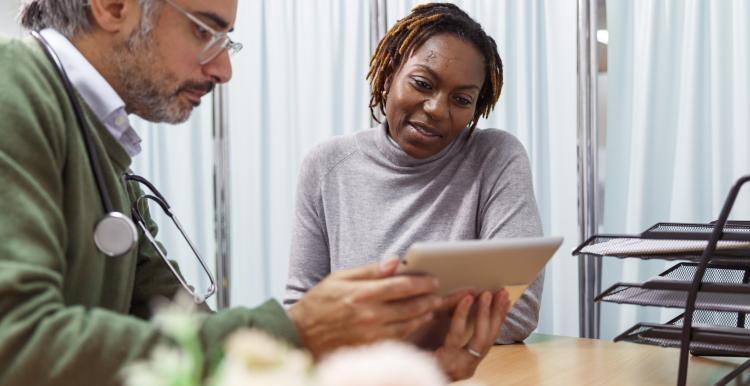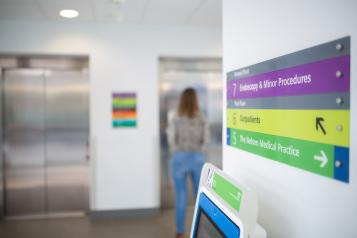Healthwatch Coventry wins national award for improving maternity care

Healthwatch Coventry has won a national award, which celebrates the difference made by local Healthwatch staff and volunteers to improve NHS and care services for local communities.
The health and social champion for the city of Coventry received the award for improving the maternity care of refugee and newly arrived women.
What did the award winner do?
Pregnancy can be an exciting, but also challenging and anxious time for many mothers and expecting parents. But it can be even more complicated and stressful if you’re new to the country or don’t understand English.
Healthwatch Coventry discovered that many pregnant refugees and asylum seekers were not receiving adequate antenatal support.
In some cases, a lack of understanding of the health system meant that many women were not even registered with a GP and didn’t know where to turn to for support.
Language barriers, costs to travel to appointments, lack of accessible information about maternity services, and racism or lack of cultural awareness by some staff meant that many women were not receiving the care they required.
In some cases, appointments were being missed or not scheduled at all.
Healthwatch Coventry teamed up with a local voluntary group, Carriers of Hope, to collect feedback from women.
The group used their parent and toddler group to gather people's experiences and identify areas for improvement.
Healthwatch Coventry analysed the findings and recommended how the NHS could improve maternity care for refugees and asylum seekers.
As a result of their work, it is now easier for refugee and newly arrived women in Coventry to access essential maternity care services.
Improvements include:
- A new direct email referral route for maternity care for women not registered with a GP;
- New translation support using mobile I-pads in the maternity unit; and
- Better communication between agencies and improved access to information for women.
Some women who participated in the study now volunteer as buddies, supporting other women in need.
The research also highlighted how the maternity care of asylum-seeking women can be disrupted when agencies move them to different places in the country during pregnancy.
Presenting the Healthwatch Impact Award, Chief Executive of Healthwatch England, Louise Ansari, said:
"It's an honour to announce Healthwatch Coventry as this year's Healthwatch Impact Award winner.
"The award recognises Healthwatch Coventry for improving access to care for some of the most vulnerable and overlooked members of their community. Everyone involved should be really proud of their achievements and their work to improve access to essential services for refugee women.
"This award also demonstrates the value of feedback. It shows how sharing your health and care story can lead to meaningful change in services and better support for local people.
"This year's winner was chosen from an exceptional field of candidates. Choosing one winner from so many incredible award entries was challenging, reflecting the remarkable impact of Healthwatch teams across England."
Highly commended for making a difference
Sixteen other Healthwatch were also highly commended or commended by the panel of judges, for their work improving health and adult social care in their communities.
Healthwatch Blackpool (highly commended) for helping to identify and tackle a rise in children and young people vaping.
Healthwatch Birmingham (commended) for their work to (a) improve maternity care for people from Black African and Black Caribbean backgrounds and (b) making sure that people from ethnic minority communities have a greater role in designing health and care services that meet their unique needs.
Healthwatch Cambridgeshire and Peterborough (commended) for delivering a Gypsy, Roma, Traveller cultural awareness programme for Integrated Care System colleagues, to tackle the health inequalities experienced by these communities.
Healthwatch Croydon (commended) for helping Black African and Black Caribbean communities co-design new mental health and wellbeing services in line with their specific views and experiences.
Healthwatch Essex (commended) for developing a new tool to help trauma survivors when traumatic memories are triggered.
Healthwatch Gloucestershire (commended) for getting the NHS to improve the mental health support available in emergency departments.
Healthwatch Herefordshire (commended) for improving people’s access to digital healthcare and support.
Healthwatch Hertfordshire (commended) for identifying the impact of the cost of living on people's health and getting more support provided.
Healthwatch Kent (commended) for improving access to health and care information for people with sensory impairments and learning disabilities.
Healthwatch Kirklees (commended) for launching the ‘carers lanyard’, ensuring that carers are immediately identifiable in health and care settings.
Healthwatch Leeds (commended) for working with local partners on the rollout of an improved citywide model of home care.
Healthwatch Milton Keynes (commended) for ensuring that more deaf patients in Milton Keynes get their legal right to accessible health and social care information and communications support if they need it.
Healthwatch North Somerset (commended) for improving access to online health services for digitally excluded people.
Healthwatch Suffolk (commended) for using the experiences of over 50,000 children and young people to shape mental health support in schools, colleges and the NHS.
Healthwatch Surrey (commended) for making it easier for people with learning disabilities to access cancer screening services.
Healthwatch Torbay (commended) for helping to improve care and support for local patients in their own home.
Have your say
Please share your experience and help us make NHS decision-makers aware of what needs to change to improve access to care, for everyone.
We’re completely independent and impartial, and anything you say is confidential.

